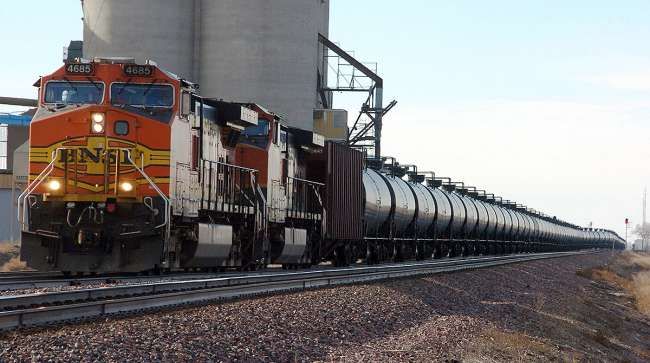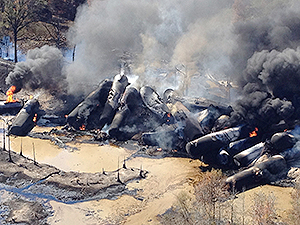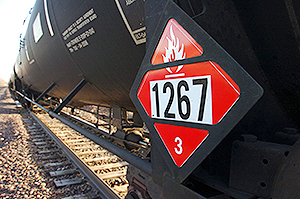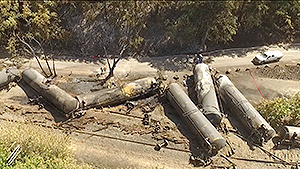Report: US Miscalculated Benefit of Better Train Brakes

BILLINGS, Mont. — President Donald Trump’s administration miscalculated the potential benefits of putting better brakes on trains that haul explosive fuels when it scrapped an Obama-era rule over cost concerns, The Associated Press has found.
A government analysis used to justify the cancellation omitted up to $117 million in estimated future damages from train derailments that could be avoided by using electronic brakes. Revelation of the error stoked renewed criticism Dec. 20 from the rule’s supporters, who called the analysis biased.
In making their cost-benefit calculations, government economists left out the most common type of derailments in which spilled and burning fuel causes property damage but no mass casualties, the AP found. Equipping fuel trains with electronic brakes would reduce damages from those derailments by an estimated $48 million to $117 million.
Department of Transportation officials acknowledged the mistake after it was discovered by the AP during a review of federal documents. They said a correction will be published to the Federal Register.
But transportation spokesman Bobby Fraser said the decision not to require the brakes would stand under a congressional act that said the costs couldn’t exceed the rule’s benefits.

In this Nov. 8, 2013 file photo, a tanker train carrying crude oil burns after derailing outside Aliceville, Ala. (Bill Castle/ABC 33/40 via AP, File)
“This was an unintentional error,” Fraser. “With the correction, in all scenarios costs still outweigh benefits.”
Safety advocates, transportation union leaders and Democratic lawmakers oppose the administration’s decision to kill the brake rule, which was included in a package of rail safety measures enacted in 2015 under President Barack Obama following dozens of accidents by trains hauling oil and ethanol in the U.S. and Canada.
The deadliest happened in Canada in 2013, when an unattended train carrying crude oil rolled down an incline, came off the tracks in the town of Lac-Megantic and exploded into a massive ball of fire, killing 47 people and obliterating much of the Quebec community’s downtown.
There have been other fiery crashes and fuel spills in Alabama, Oregon, Montana, Virginia, West Virginia, North Dakota, Illinois and elsewhere.
Sen. Jeff Merkley (D-Ore.) said the administration should reconsider the brake rule in light of its miscalculation.
“The omission of $117 million from the rule’s anticipated benefits is further proof that the Trump administration is willing to cut corners to put industry profits ahead of the American people’s safety,” said Merkley. He called for “a new cost-benefit analysis that is full and transparent.”
After the brake rule was enacted, lobbyists for the railroad and oil industries pushed to cancel it, citing the high cost of installing so-called electronic pneumatic brakes and questioning their effectiveness.
But supporters of the brakes said the issue should be reconsidered given the miscalculation and concerns about other benefits that may have been ignored, including reducing the frequency of runaway trains and severity of train-on-train collisions, said Robert Duff, a senior adviser to Washington Gov. Jay Inslee, a Democrat.

A warning placard on a tank car carrying crude oil near a loading terminal in Trenton, N.D. (Matthew Brown/AP)
“This is not theoretical risk. We’ve actually seen these derailments,” Duff said.
Unlike other systems where brakes are applied sequentially along the length of a train, electronic pneumatic brakes, or ECP, work on all cars simultaneously. That can reduce the distance and time a train needs to stop and cause fewer cars to derail.
“These ECP brakes are very important for oil trains,” said Steven Ditmeyer, a rail safety expert and former senior official at the Federal Railroad Administration. “It makes a great deal of sense: All the brakes get applied immediately, and there would be fewer cars in the pileup.”
Under Obama, the Transportation Department determined the brakes would cost up to $664 million over 20 years and save between $470 million and $1.1 billion from accidents that would be avoided.
The Trump administration reduced the range of benefits to between $131 million and $374 million.

In this June 6, 2016, file aerial video image taken from a drone, crumpled oil tankers lie beside the railroad tracks after a fiery train derailment that prompted evacuations from the tiny Columbia River Gorge town of Mosier, Ore. (Brent Foster via AP)
Transportation Department economists said in their analysis that the change was prompted in part by a reduction in oil train traffic in recent years. Even as ethanol shipments on U.S. railroads have continued to grow, reaching about 500,000 carloads annually, crude shipments peaked in 2014 and fell to about 200,000 carloads last year.
But in making their cost-benefit calculations, government economists left out the most common type of derailments in which spilled and burning fuel causes property damage but no mass casualties, the AP found. Equipping fuel trains with electronic brakes would reduce damages from those derailments by an estimated $48 million to $117 million, according to Department of Transportation estimates that were left out of the administration’s final tally.
Including the omitted benefits reduces the net cost of the requirement to as low as $63 million under one scenario laid out by the agency. Other scenarios put the net cost at more than $200 million.
Transportation spokesman Fraser said that would not have changed September’s decision to cancel the electronic brake requirement because of the cost.
The Association of American Railroads declined comment on the agency’s cost-benefit calculations. Spokeswoman Jessica Kahanek said the move to rescind the Obama rule was in line with the requirements set forth by Congress, which passed a 2015 measure saying the Department of Transportation must repeal the braking requirement if expected costs exceed benefits.

